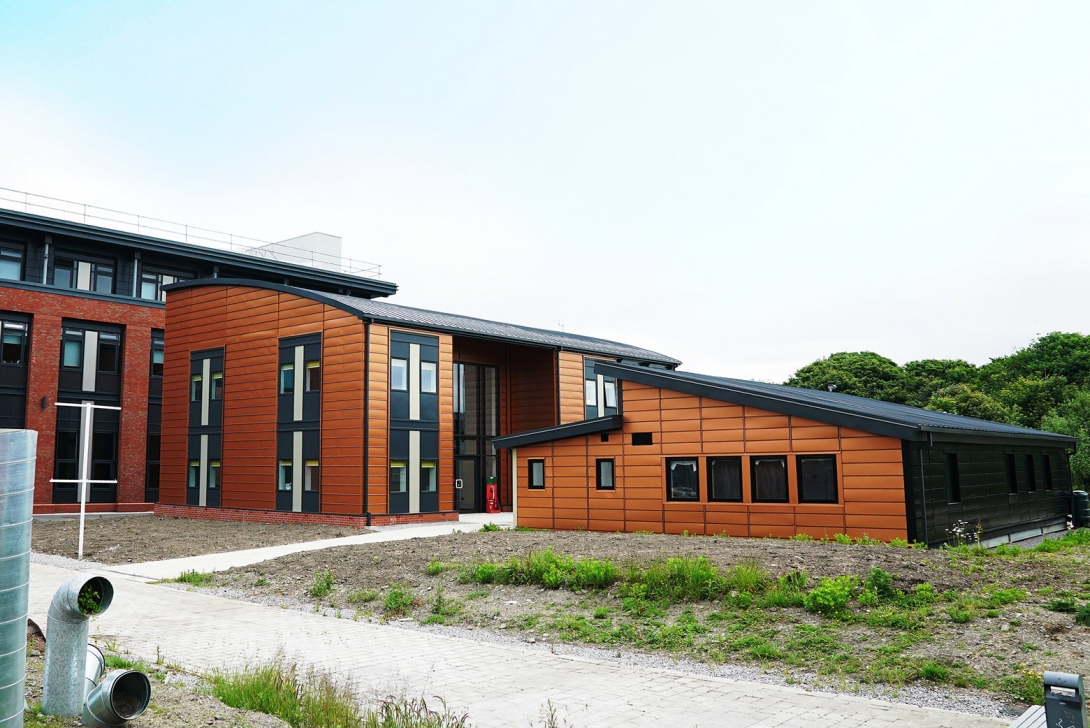
Pilkington UK Ltd has contributed glazing and technical expertise to academics at the Sustainable Product Engineering Centre for Innovative Functional Industrial Coatings (SPECIFIC) at Swansea University, to help deliver the UK’s first net energy-positive commercial building.
The Active Office, located on Swansea University’s new £450 million Bay Campus, is a prototype for net energy-positive commercial spaces and aims to demonstrate the organisation’s broader ‘buildings as power stations’ concept. Over an annual cycle the building is designed to generate more energy than it consumes.
The 400 sq m structure features working space for 25 people beneath a curved roof with laminated photovoltaic cells able to generate 22kW of electrical power at peak output. A range of additional technologies enable it to generate, store and release solar energy in a single, integrated system that can be easily and commercially replicated.
The Active Office, funded by Innovate UK, builds upon the principles developed with the Active Classroom, a learning and education demonstrator, designed by SPECIFIC, located at the same site. These two buildings can share information and energy providing a small ecosystem for further demonstration of Active Technologies.
The classroom project, which uses a range of innovative renewable energy and efficiency-enhancing technologies, contains a laboratory and classroom used for teaching students. For that project, Pilkington also supplied its Pilkington Sunplus™ BIPV glass, which features photovoltaic power-generation technology, turning the windows into an energy source for the building.
The innovative, energy-efficient design also features low-emissivity, double-glazed aluminium-clad timber frame windows and doors, incorporating Pilkington energiKare™ Advantage glass, which help to reduce its energy use.
Pilkington energiKare™ Advantage is twice as energy-efficient as standard double glazing as it uses advanced dual coatings to reduce heat loss through windows and allows more heat from the sun to enter the building – this effect is known as solar gain. This improves the energy efficiency of the windows and subsequently helps to reduce the cost of heating bills.
Tony Smith, Business Development & Value Added Products Manager for Pilkington UK and Ireland, said:
“Thinking about how energy is used, generated and stored in the built environment in future is one of the biggest challenges the UK construction industry faces. We’re committed to contributing to the effort by developing and delivering new advances in energy-efficient glazing technology.
“Forging strong links with academia so that there is a robust route for cutting-edge technology to feed into products available commercially is a key part of our ethos as a business, and projects like the Active Office and Active Classroom each play an important part in this process, demonstrating what can be achieved when the right combination of technologies, expertise and working partnerships is in place.”
Justin Searle, Industrial Technology Director at SPECIFIC, said:
“When it comes to improving the overall efficiency of buildings, it is not the performance of any individual product that matters most, but how all of the elements work together to generate, store and release energy.
“This project is not just about showing what can be achieved by the right combination of products, but also getting construction industry partners working closely together to develop the skills and ways of working that will deliver better performing buildings in the future.”
Notes
NSG Group, the manufacturer of Pilkington glass in the UK, manufactures a wide range of float, coated, rolled, laminated, fire-resistant and toughened glass products as well as its own range of high-performance insulating glass units. Glass is distributed direct to customers, either as stock or as bespoke processed products to meet their needs, either direct from St Helens or through its network of branches countrywide. The company is highly focused on quality and service, continually improving to deliver the benefits of the NSG Group's technical ability and innovation to the end user.
With around 27,000 employees, NSG Group has principal operations worldwide and sales in over 100 countries. In the fiscal year ending 31 March 2018, the Group reported revenue of JPY 603.9 billion (approximately euro 4.65 billion). Of this, 38 per cent was generated in Europe, 27 per cent in Japan, 13 per cent in North America and 22 per cent in the rest of the world.”
www.pilkington.com/en-GB/uk


